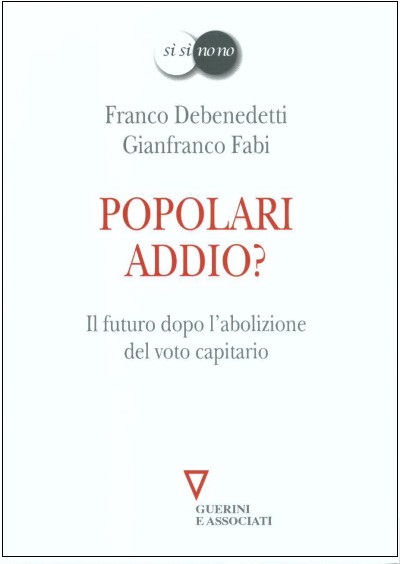
Registrazione audio del dibattito dal titolo “Presentazione del libro di Franco Debenedetti dal titolo: “Scegliere i vincitori, salvare i perdenti. L’insana idea della politica industriale”", registrato a Bergamo martedì 13 dicembre 2016 alle 18:13.
leggi il resto ›

Recensione a
Italia si cambia. Identikit della riforma costituzionale,
di Giovanni Guzzetta,
Rubbettino, Soveria Mannelli,
pagg. 206, € 15
«Fin dalla fondazione della Repubblica, il discorso pubblico sulle istituzioni ha avuto la transizione come chiave fondamentale di narrazione. L’Italia è stata sempre interpretata come una Repubblica transitoria, una democrazia incompiuta a cui mancano (ancora?) le condizioni politiche e istituzionali perché il gioco democratico si possa svolgere all’insegna della normalità». Per Giovanni Guzzetta le scelte di politica legislativa costituzionale vanno collocate nel contesto, storico, politico, istituzionale: e chiude con queste riflessioni Italia si cambia, il denso libro scritto per fare l’«identikit della riforma costituzionale» del governo Renzi. Il momento della normalità, annota, è stato sempre stato spostato in avanti dal susseguirsi delle eccezionalità: il fascismo, la liberazione, il più grosso partito comunista del mondo occidentale, il terrorismo, Mani pulite, Berlusconi, le crisi da Lehman in avanti. E poiché l’essenza della politica è prospettare un futuro e disegnare le azioni per realizzarlo, per settant’anni la partita politica si è giocata su queste idee, transitorietà e incompiutezza. Nel nome della transitorietà si sono giustificate sia la provvisorietà delle soluzioni deboli sia la fragilità di quelle decisioniste. Nel nome dell’incompiutezza si sono giustificati sia il ruolo maieutico di élite che proteggessero la democrazia dalle spinte populiste o eversive, sia la teoria della convergenza di forze politiche che evitasse il gioco competitivo tra loro.
leggi il resto ›
![]()
recensione di Antonio Polito al nuovo libro di Franco Debenedetti
Esce il saggio «Scegliere i vincitori, salvare i perdenti» (Marsilio). Teoria, prassi e sperperi dello Stato imprenditore in un’analisi critica di Franco Debenedetti
«Anche nelle maggiori ristrettezze, i denari del pubblico si trovano sempre, per impiegarli a sproposito». Alessandro Manzoni conosceva così bene il nostro carattere nazionale (tendiamo facilmente a dimenticare che il denaro pubblico è nostro), da meritarsi la citazione d’apertura nel nuovo libro di Franco Debenedetti, vera e propria biografia di un’idea (anzi, di «un’insana idea», come è definita nel sottotitolo). L’idea è quella della «politica industriale», e cioè di una «politica in cui l’attività industriale è svolta più o meno direttamente dal potere pubblico», che ha percorso la storia d’Italia da Giolitti a Renzi, e che ancora oggi resta popolare sia nel senso comune di molti italiani sia nella prassi di tanti politici. La convinzione insomma che tocchi allo Stato Scegliere i vincitori, salvare i perdenti della competizione economica (come nel titolo del volume in libreria da oggi, m per Marsilio).
leggi il resto ›

Scegliere i vincitori, salvare i perdenti.
L’insana idea della politica industriale
di Franco Debenedetti
2016, Marsilio
Protezionismo, autarchia, keynesismo, programmazione, strategie, italianità: tutte variazioni su uno stesso tema, l’idea che lo Stato, per governare l’economia, debba intervenire e sappia farlo imboccando le strade giuste.
È la politica industriale: lo Stato si sostituisce al mercato e sceglie i vincitori della gara concorrenziale. Salvo poi, quando l’«insana idea» non ha successo, dover correre ai ripari salvando i perdenti.
leggi il resto ›

Il libro del neo ministro
“La crisi greca non è un caso speciale, non deriva dall’incapacità di fare riforme strutturali: rappresenta la crisi del progetto neoliberista”. Apre così il “Crogiuolo della Resistenza”, scritto, insieme a Christos Laskos, da Euclide Tsakalokis, il ministro che ha sostituito Varoufakis. Non è un instant book, è del 2012. Non è un pamphlet, è l’analisi di economisti colti ricca di tabelle e grafici, è il programma di marxisti rigorosi convinti dell’inevitabile fine della “sintesi neoliberista” su cui è costruita l’Europa. Mostra come dietro negoziazioni erratiche e comportamenti stravaganti, ci sia, preparata da anni, una strategia economica che va oltre il momento, propositi politici che vanno aldilà della Grecia.
leggi il resto ›

Presentazione del libro
Popolari addio?
Il futuro dopo l’abolizione del voto capitario.
di Franco Debenedetti e Gianfranco Fabi
2015, Guerini e Associati
20 Maggio 2015 – ore 18.00
Centro Studi Americani e Formiche – Via M. Caetani 31 – Roma
Ne parlano con gli autori:
Michele Arnese – Direttore formiche.net
Lodovico Festa – Giornalista e direttore della collana Si Si No No
Modera:
Paolo Messa
leggi il resto ›






